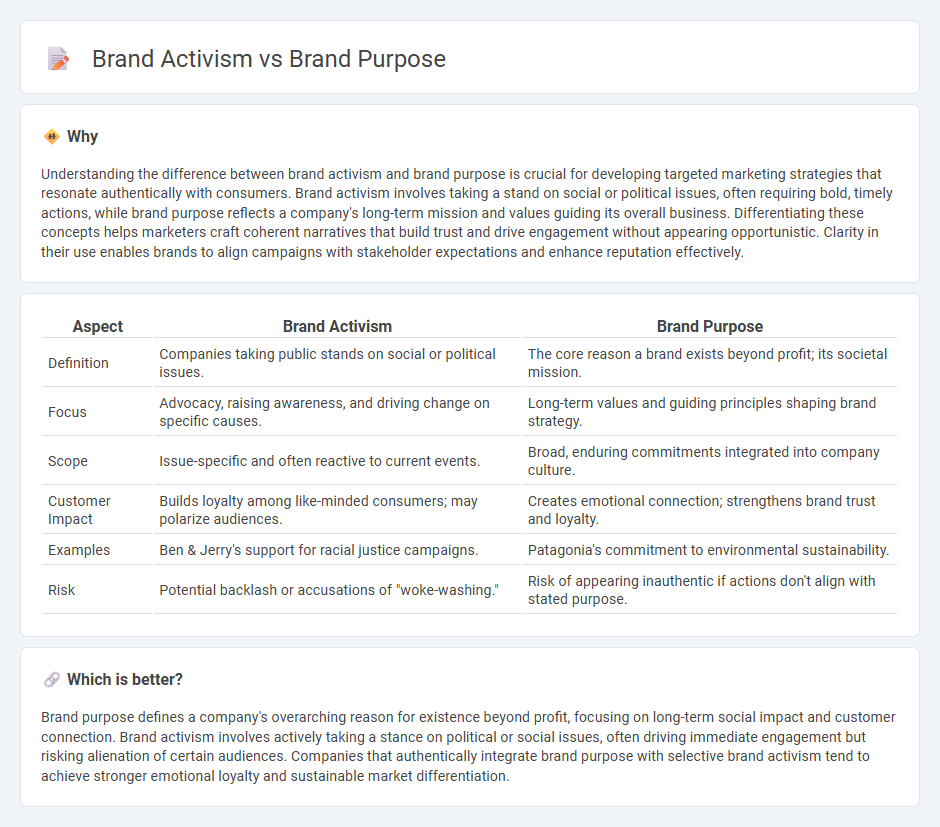
Brand activism drives companies to take a stand on social and political issues, influencing public perception and customer loyalty through active engagement. Brand purpose focuses on a company's core mission and values, guiding long-term business strategies and creating meaningful connections with audiences. Explore the distinctions and synergies between brand activism and brand purpose to enhance your marketing impact.
Why it is important
Understanding the difference between brand activism and brand purpose is crucial for developing targeted marketing strategies that resonate authentically with consumers. Brand activism involves taking a stand on social or political issues, often requiring bold, timely actions, while brand purpose reflects a company's long-term mission and values guiding its overall business. Differentiating these concepts helps marketers craft coherent narratives that build trust and drive engagement without appearing opportunistic. Clarity in their use enables brands to align campaigns with stakeholder expectations and enhance reputation effectively.
Comparison Table
| Aspect | Brand Activism | Brand Purpose |
|---|---|---|
| Definition | Companies taking public stands on social or political issues. | The core reason a brand exists beyond profit; its societal mission. |
| Focus | Advocacy, raising awareness, and driving change on specific causes. | Long-term values and guiding principles shaping brand strategy. |
| Scope | Issue-specific and often reactive to current events. | Broad, enduring commitments integrated into company culture. |
| Customer Impact | Builds loyalty among like-minded consumers; may polarize audiences. | Creates emotional connection; strengthens brand trust and loyalty. |
| Examples | Ben & Jerry's support for racial justice campaigns. | Patagonia's commitment to environmental sustainability. |
| Risk | Potential backlash or accusations of "woke-washing." | Risk of appearing inauthentic if actions don't align with stated purpose. |
Which is better?
Brand purpose defines a company's overarching reason for existence beyond profit, focusing on long-term social impact and customer connection. Brand activism involves actively taking a stance on political or social issues, often driving immediate engagement but risking alienation of certain audiences. Companies that authentically integrate brand purpose with selective brand activism tend to achieve stronger emotional loyalty and sustainable market differentiation.
Connection
Brand activism and brand purpose are interconnected through their shared commitment to social and environmental causes that resonate with consumers. Brand purpose defines a company's core mission beyond profit, shaping authentic activism efforts that foster trust and loyalty. Effective brand activism amplifies this purpose by demonstrating tangible actions, driving deeper engagement and differentiation in competitive markets.
Key Terms
Mission
Brand purpose defines a company's core reason for existence, centered on its mission to create value beyond profits by addressing social or environmental issues. Brand activism actively engages the company in specific campaigns or movements that align with its purpose to drive tangible change and influence public perception. Explore how aligning mission-driven purpose with activism strategies can amplify your brand's impact.
Social impact
Brand purpose defines a company's core mission and values, targeting long-term positive social impact through sustainable business practices. Brand activism actively addresses social issues, often taking a public stance to drive societal change and engage communities directly. Explore how integrating brand purpose with activism can amplify social impact and foster stronger consumer trust.
Advocacy
Brand purpose defines a company's core mission and values, guiding long-term business strategies to create meaningful impact, while brand activism emphasizes taking specific, vocal stands on social or political issues to drive social change. Advocacy serves as a crucial element in both concepts by engaging stakeholders and influencing public opinion to support causes aligned with the brand's ethos. Explore how integrating focused advocacy enhances brand authenticity and strengthens consumer trust.
Source and External Links
Brand Purpose: Definition, Value & Examples - Qualtrics - Brand purpose is a company's reason for being and the things it stands for beyond business goals, often reflecting founders' values or a market need and can be ethical, political, moral, or results-focused.
Brand Purpose: Finding Your Brand's "Why" - Mailchimp - Brand purpose defines why a company exists beyond profit, rooted in values, shaping its mission, business model, and customer connections by doing good or improving lives aligned with customer values.
Brand Purpose: What It Is and Why It's Important - HubSpot Blog - Brand purpose helps differentiate a company, rally teams, build loyalty, inspire innovation, attract talent, enhance reputation, and create meaningful impact supporting long-term business success.
 dowidth.com
dowidth.com